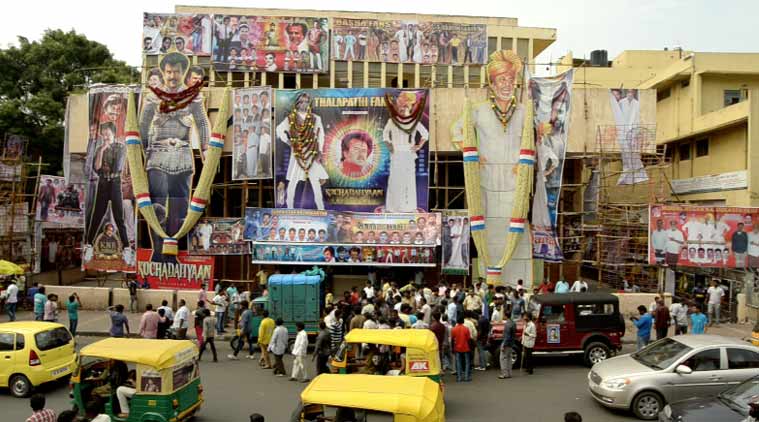Fans celebrate the opening of Rajinikanth-starrer Kochadaiiyaan.
In 2005, a few days before the release of Chandramukhi, Gopi finally got an opportunity he had been waiting for. After languishing at the bottom of the hierarchy for years, he was finally awarded a “position” at the Mylapore Rajinikanth Fan Club in Chennai. But the role came with responsibilities. Gopi was given charge of producing digital printouts of the new film of their hero and promote it across Tamil Nadu.
The savings from his job as a delivery man of gas cylinders wasn’t enough. Time was running out for Gopi, as he was inching closer to the release date. He didn’t just need Rs one lakh, he needed it urgently. Gopi sold off the kholi he was living in with his parents and siblings for a lakh instead of its market price of Rs three lakh.
It shocked filmmaker Rinku Kalsy when she first heard the story from Gopi himself. How could one feel such blind devotion to a movie star that puts at stake a basic need of one’s entire family, she thought. But as she started to talk at length with Gopi and others like him, Kalsy began to understand the various dimensions of Rajinikanth’s fandom. We know about the Tamil superstar’s demi-god status among fans – ranging from 60 to 16-year-olds. But Kalsy’s documentary, For the Love of a Man, looks at it as a complex phenomenon that involves a state’s cultural identity and the link between its cinema, culture and politics. The film will have a world premiere at the prestigious Venice Film Festival next month.
“The idea came from Joyojit Pal, the producer of the film and a professor at the University of Michigan. While working with Microsoft in Coimbatore, interacting with children from rural areas, he noticed a sudden surge in their interest in a career in computer sciences. They were inspired by Rajinikanth’s role in his then latest film, Sivaji. It got us thinking about making a film on this,” recalls Kalsy as she puts the final touches to her film before sending it to Venice.
For the Love of a Man, made over four years, films several key events that showcase Rajinikanth’s fanfare: the release of his movies Endhiran, Kochadaiiyaan, Lingaa and 3D apart from his 62nd birthday that fell on the auspicious date, 12.12.12. The film follows four fans and how their fanaticism impacts the lives of their family members. A clip from the film uploaded on YouTube shows a man not only confessing to the director that he resorted to selling off his wife’s jewellery to raise funds for a Rajini event, but even pleading that they don’t reveal this to his spouse. The family members, in a way, have also accepted Thalaiva (the way the fans address Rajinikanth) as a part of their family.
“A majority of these fans belong to the low income group. Being part of it all gives them a sense of identity and a social standing,” explains Kalsy, a filmmaker who shuttles between Amsterdam and Mumbai. For the Love of a Man delves into the workings of such fan clubs. Pal describes them as “closest comparable to something like a Ganeshotsav or Durga Puja committee”. “They take on the responsibility of an event, then contribute their own funds as well as gather more from those interested in the event. Often you will see posters of the event with Rajinikanth as its face, but small photographs of all the people from the fan club who contributed at the local level to make it a success,” writes Pal, in an email interview from the US.
“The film looks at the Rajini fanfare as a quintessentially Tamil Nadu phenomenon. “We’ve tried to explain how it is embedded in the atheism-based Dravidian movement. Since there is no god, there is a need for a figure to look up to. It is also reflective of the larger Indian culture of iconisation,” says Kalsy.
There is politics involved too. The fan clubs — there are about 1.5 lakh, apparently — use the events to mobilise strength at a local level for the various parties they are associated with. The 64-year-old superstar himself hasn’t shown any political leaning so far — except once, in 1996, when his stance against AIDMK turned the tide against the party in that election. Tamil Nadu’s tradition of film personalities entering politics — Sivaji Ganesan, MG Ramachandran, Karunanidhi, Jayalalitha, Sarath Kumar and Vijaykanth, among others — is well-known. “The fans live with the utopian idea that one day, when Rajinikanth enters politics, they will all join in hordes as his foot soldiers,” says Kalsy. The god of small things will surely be pleased.

